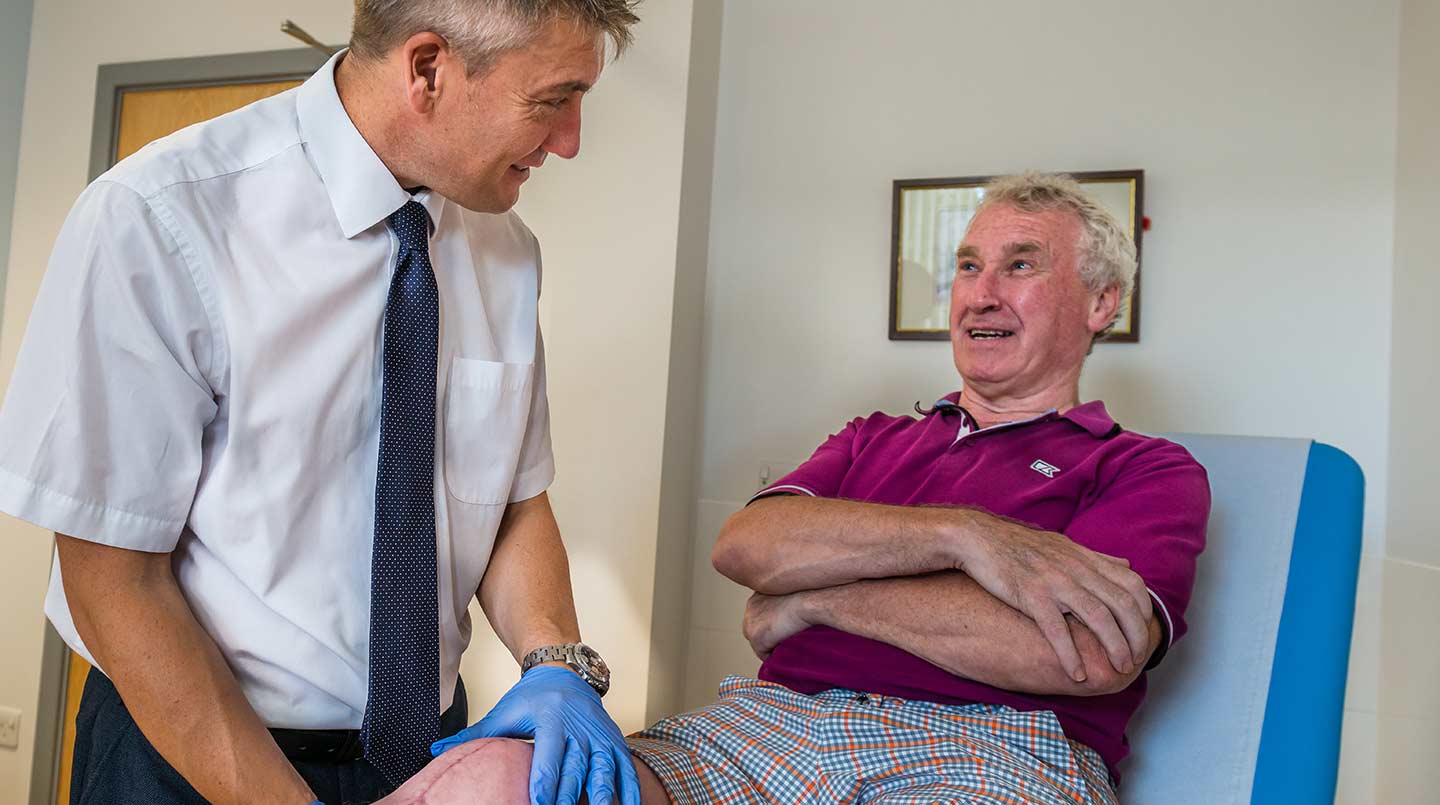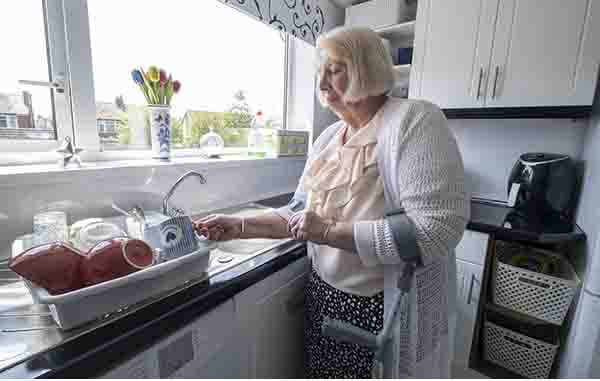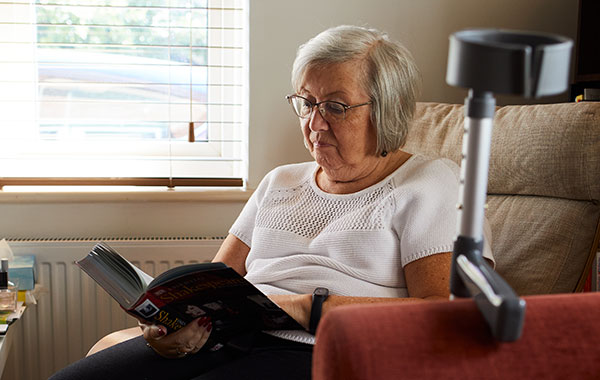How to plan and prepare for post-surgery recovery: Gaby’s story and tips
07 October 2024
Not everyone with arthritis will need surgery, but it might be offered to you to help reduce pain and improve your mobility if other treatments haven’t worked well enough.
If you’ve been told that you need surgery for your arthritis, Gaby, 60, who has rheumatoid arthritis and has had several major surgeries, suggests preparing as much as possible for your return home from surgery.
Here, Gaby shares her story and some of the simple acts of preparation she’s learnt that can make a huge difference to surgery recovery.
Read more about the common types of surgery for people with arthritis
Surgery and rheumatoid arthritis: Gaby’s story
Rheumatoid arthritis is a condition that can cause pain, swelling and stiffness in joints.
It is what is known as an auto-immune condition. This means that the immune system, which is the body’s natural self-defence system, gets confused and starts to attack your body’s healthy tissues. In rheumatoid arthritis, the main way it does this is with inflammation in your joints.
Gaby was born in South Africa and was diagnosed there before moving to the UK.
“It took about seven years to diagnose me with arthritis,” she says, “so unfortunately a lot of damage had already been done to my joints. I also had multiple exploratory surgeries and treatments prior to them understanding what was wrong with me.”
“My joints tend to take turns in deciding which ones are going to hurt on any given day. On a bad day, there’ll be a lot of pain in that joint. On a really bad day, multiple joints will be affected.”
Gaby has had several different surgeries, including a total knee replacement, a full elbow replacement, an ankle replacement, and an osteotomy on her foot. She found the osteotomy to be “the most frustrating, because I was not allowed to put any weight on it for eight weeks.”
Surgery recovery
The most common types of surgery for arthritis include:
- Joint replacement surgery (replacing damaged parts of your joint with metal or plastic parts)
- Keyhole surgery (techniques to wash out loose fragments of bone and other tissue)
- Joint fusion surgery (where the bones in a joint are fixed together surgically)
How quickly you recover after surgery depends on many factors, including the nature of the procedure, your age, your general health, the strength of your muscles and the condition of your other joints. There will always be a period of adjustment post-surgery, and your doctor will give you an idea of how long this will be.

Staying active is important if you’re waiting for or recovering from surgery. If you’re fit and strong, your surgery has the best chance of success, and you’ll likely recover quicker.
Your surgeon will probably recommend muscle-strengthening exercises to do in the weeks before the operation, as this can help with your recovery.
Versus Arthritis also offers Let’s Move for Surgery, a surgery toolkit with tailor-made, follow-along exercise routines for hip, shoulder and knee replacement, as well as full body workouts to help you maintain overall fitness.
Gaby’s tips for surgery recovery
After having lots of operations over the years, Gaby has learnt how to make sure that she is as prepared as possible for the return home from hospital.
“It is good,” Gaby says, to “find ways to put yourself back into control. A way to do that is to plan. Do the things that are going to help you later. Then you’ll feel you’ve got a bit of control over what’s happening.
“Once you have had the surgery and are safely back home," she says, "it is important that you have everything that you need and within easy reach, to keep yourself pain-free, healthy and occupied.”
Here are Gaby’s tips:
Speak to a physiotherapist
As being fit and strong helps to increase the likelihood of a quick recovery after surgery, it’s important to make sure you’re adding movement into your life before and after surgery in a way that works for you.
“If you’re about to have lower limb surgery, try and get your arms, shoulders and core muscles as strong as possible.”
If you aren’t sure where to start with physical activity, Gaby recommends seeking advice from a healthcare professional or a physiotherapist.
“I’m extremely passionate about physiotherapy,” says Gaby. “It’s hard work when it’s done properly, but it’s totally worth it."
Arrange your home
Surgery can have a massive impact on everyday activities.
“It was very important,” Gaby says, “to create an environment where I could be as independent as possible."
It is good to identify how the surgery will affect your mobility in daily life beforehand to ensure that you are well-equipped.
“Things like checking I could get on and off the toilet,” says Gaby, “or have a bath/shower without help or make a cup of tea or get to my computer, those were important for me.”
Before you leave hospital, an occupational therapist will assess your physical ability and your situation at home. They may arrange special equipment for you, such as a raised toilet seat or gadgets to help you dress. It is a good idea to do some research yourself in case some equipment is needed that the occupational therapist is unable to provide.

Gaby suggests some additional changes to your home to make things more accessible, such as:
- Moving plates and cups to a lower or higher shelf for easier access
- Moving clothing and toiletries downstairs until you can navigate the stairs
- Re-arranging furniture so that there is space to move around with crutches or a wheelchair
- Checking that the plugs are easy to reach or using extension cords.
Make arrangements for wound care
Depending on the type of surgery you have had, it’s important to make arrangements for wound care. If you have stitches or clips that need removing, this can be done on a return visit to hospital, at home by a visiting nurse, or at your GP’s surgery.
Your surgeon may advise you not to get your wound dressing wet until the stitches are removed, which is usually about two weeks from the day of your surgery.
“If you feel that you will need more than a daily sponge bath during this time, you can get a waterproof cover that is designed specifically for casts and dressings,” says Gaby.
“It’s a good idea to get one of these well in advance so that you can practice using it before the surgery.”
Prioritise acts of self-care
When you’re recovering from surgery, Gaby stresses the importance of acts of self-care. It’s important to look after your emotional wellbeing and talk to friends and family about how you’re feeling.

Gaby recommends some acts of self-care that can be done before the surgery to make life easier, and others that you can do during recovery, such as:
- Cutting your nails and hair before surgery, as this may be difficult to do during recovery
- Thinking about your post-surgery wardrobe and making sure that soft, loose clothing is easy to find
- Increasing your fibre intake as some pain medication can lead to constipation
- Taking a probiotic or eating a yoghurt daily to maintain a healthy digestive system.
Plan activities
“One of the most difficult aspects of the recovery period is boredom,” says Gaby.
“Keeping yourself busy and entertained goes a long way to keeping your spirits up, which in turn, helps the healing process.”
Gaby suggests making a list of things to do that you can look forward to each day, such as:

- Reading a book or watching a tv series you have been meaning to get around to
- Joining or starting an online book club
- Writing a novel or short story
- Signing up for an online course
- Getting involved with a charity
And a final piece of advice: “Don’t rush your recovery process,” Gaby advises. “It will take as long as it needs. Trying to rush things often results in injuring yourself, which will make your recovery time even longer!”
Are you currently waiting for surgery?
One of our priorities for the new government is to bring down waiting times for people with arthritis and support them while waiting.
Read our manifesto and sign our open letter.
We’re here to help
- If you would like to talk to someone, you can call our free helpline on 0800 5200 520
- Chat to our Arthritis Virtual Assistant
- Join our online community
- Stay in touch and follow us on Twitter/X, Facebook and Instagram